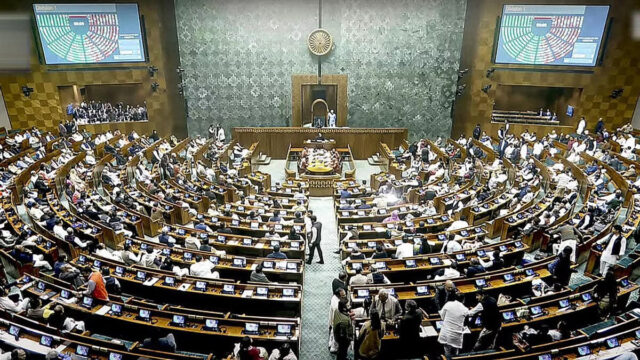The One Nation, One Election has been a very controversial bill for some time. The Constitution (One Hundred and Twenty-Ninth Amendment) Bill 2024 proposes elections for both Lok Sabha and State Assemblies to be held simultaneously with a fixed five-year tenure for the elected government.
It also puts forward that should any assembly be dissolved during this timeframe, and then a new one would be elected during a mid-term poll. The new assembly’s tenure, however, would be the remainder of the term for the previous one.
A high-level committee, chaired by former President Ram Nath Kovind, was formed in September 2023 by the Government of India to examine the One Nation, One Election bill and whether it is feasible in the country or not.
An extremely detailed 18,626-page report was submitted by the committee on 14 March 2024 as per reports, to President Droupadi Murmu.
Recently, the Lok Sabha passed the motion to introduce two bills related to ONOE The Constitution 129th Amendment Bill 2024’ and ‘The Union Territories Laws Amendment Bill 2024’ into the Parliament.
What Do Experts Say?
The concept of a ‘One Nation, One Election’ has resulted in a lot of debate about the pros and cons it could bring.
Given the enormity of the situation, if it is eventually approved, that is the very amendment of the Constitution of India on a very large scale and the election process, the decision must be made properly.
Harish Salve a senior advocate and one of India’s top constitutional experts commenting on this has refuted the opposition’s claim that the ONOE violates federalism. Speaking with India Today he said, “Those who say One Nation One Election violates the federal structure are shooting from the hip. Every Indian is a stakeholder in this. It’s not only for the politicians.”
Salve speaking about the allegation that this could make the states timid in front of the Union of India said, “The states will always be governed by the party chosen by the people who vote in the state… What happens if an elected government falls? There is no constitutional guarantee that you can run for 5 years.”
He further added, “The electorate is far wiser, very mature and intelligent. The politicians should come to terms.”
However, Salve added that the ONOE cannot be rushed, stating, “One Nation One Election cannot be implemented in the next 3–5 years. There needs to be a larger national debate. The government will have to create a consensus of larger public opinion.”
Read More: One Nation, One Election: Can India Ever Go Back To Simultaneous Elections?
Gilles Verniers in an Economic Times report also wrote, “Critics of ONOE have raised the danger posed by nationalising the electoral process. Like all reforms preceded by the moniker ‘One Nation…’, ONOE aims at centralising and concentrating powers. National personality contests would likely precede regional issues in a simultaneous election regime.”
The report also pointed out that the point about how ONOE would help save election costs doesn’t stand since the cost here is more about the money spent by parties while campaigning and not the actual act of elections itself.
Former Supreme Court judge Ajay Rastogi also commented on the ONOE saying, “The objective of holding simultaneous elections seems to be correct. Personally, there is nothing wrong with it,” adding that the “Constitution only envisages there should be elections. Whether it must be simultaneous or at different points of time, is not specified. This will give more time for governments to focus on development, infrastructure and welfare activities that can take the country forward.”
Senior advocate and constitutional expert Rakesh Dwivedi also seems to agree with ONOE saying, “We should not become a nation of elections. There are practical problems in holding elections throughout the year. These issues have been addressed by this law.”
Senior advocate Gopal Sankaranarayanan, however, has concerns that “The idea seems to be to avoid inconvenience to voters and save money as any election entails expenditure. But we have survived for 75 years. It is not practical to hold simultaneous elections. I do not understand the need for doing so.”
Justice Rastogi also doesn’t deny that this is a very sensitive matter and should be dealt with very carefully. He said, “There should be a healthy discussion on this law as the consequences may be drastic. The question is how long simultaneous elections can continue. Suppose if you hold simultaneous elections that may take roughly three months, everything will come to a standstill.”
There has also been fake news spreading that the Lok Sabha has passed the ‘One Nation, One Election’ bill. This is not true as the Parliament has approved it to be introduced and hasn’t passed it.
As per a fact check done by Deccan Herald, two bills called ’The Constitution 129th Amendment Bill 2024′ and ‘The Union Territories Laws Amendment Bill 2024’ were introduced by the Minister of State (Independent Charge) for Law & Justice and Minister of State for Parliamentary Affairs, Arjun Ram Meghwal on 17 December 2024. Both these bills are part of the overall ‘One Nation, One Election’ concept.
The voting where 269 MPs voted in favour while 198 MPs voted against was to decide whether the bills would be introduced into the Parliament.
Image Credits: Google Images
Sources: The Economic Times, Hindustan Times, Deccan Herald
Find the blogger: @chirali_08
This post is tagged under: One Nation One Election, One Nation One Election bill, One Nation One Election lok sabha, One Nation One Election bill passed, One Nation One Election india, One Nation One Election bill explain, One Nation One Election experts, One Nation One Election india impact, india, government, indian election
Disclaimer: We do not hold any right, or copyright over any of the images used, these have been taken from Google. In case of credits or removal, the owner may kindly mail us.
Other Recommendations:
Demystifier: Everything You Should Know About ‘One Nation One Election’



































